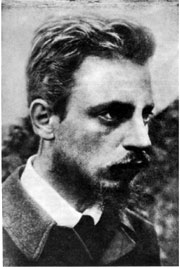
click image for bio
Rainer
Maria Rilke
(1875-1926)
"On
Love & Other Difficulties..."
Rilke on Marriage...
The point of marriage is not to create a quick commonality by tearing down all boundaries; on the contrary, a good marriage is one in which each partner appoints the other to be the guardian of his solitude, and thus they show each other the greatest possible trust. A merging of two people is an impossibility, and where it seems to exist, it is a hemming-in, a mutual consent that robs one party or both parties of their fullest freedom and development. But once the realization is accepted that even between the closest people infinite distances exist, a marvelous living side-by-side can grow up for them, if they succeed in loving the expanse between them, which gives them the possibility of always seeing each other as a whole and before an immense sky.
Translated from the German by Stephen Mitchell
from Rainer Maria Rilke's
Letters To A Young Poet
(1903-1908)
People have (with the help of conventions) oriented all their solutions toward the easy and toward the easiest side of the easy; but it is clear that we must hold to what is difficult; everything alive holds to it, everything in Nature grows and defends itself in its own way and is characteristically and spontaneously itself, seeks at all costs to be so and against all opposition. We know little, but that we must hold to what is difficult is a certainty that will not forsake us; it is good to be solitary, for solitude is difficult; that something is difficult must be a reason the more for us to do it.
To love is good, too: love being difficult. For one human being to love another: that is perhaps the most difficult of all out tasks, the ultimate, the last test and proof, the work for which all other work is but preparation. For this reason young people, who are beginners in everything, cannot yet know love: they have to learn it. With their whole being, with all their forces, gathered close about their lonely, timid, upward-beating heart, they must learn to love. But learning time is always a long, secluded time, and so loving, for a long while ahead and far into life, is solitude, intensified and deepened loneness for him who loves.
Love is at first not anything that means merging, giving over and uniting with another (for what would a union be of something unclarified and unfinished, still subordinate?); it is a high inducement to the individual to ripen, to become world, to become world for himself for another's sake. It is a great exacting claim upon him, something that chooses him out and calls him to vast things. Only in this sense, as the task of working at themselves ("to hearken and to hammer day and night"), might young people use the love that is given them. Merging and surrendering and every kind of communion is not for them (who must save and gather for along, long time still), is the ultimate, is perhaps that for which human lives as yet scarcely suffice.
Whoever looks seriously at it finds that neither for death, which is difficult, nor for difficult love has any explanation, any solution, any hint of way yet been discerned; and for these two problems that we carry wrapped up and hand on without opening, it will not be possible to discover any general rule resting in agreement. But in the same measure in which we begin as individuals to put life to the test, we shall, being individuals, meet these great things at closer range.
The demands which the difficult work of love makes upon our development are more than life-size, and as beginners we are not up to them. But if we nevertheless hold out and take this love upon us as burden and apprenticeship, instead of losing ourselves in all the light and frivolous play, behind which people have hidden from the most earnest earnestness of their existence - then a little progress and alleviation will perhaps be perceptible to those who come long after us; that would be much.
Other Sources of Rilke's Writings
famouspoetsandpoems.com (Rilke)
RAINER
MARIA RILKE AND PAULA MODERSOHN-BECKER
The stories
behind their meeting (1900-1907)
Rilke's "REQUIEM FOR A FRIEND" (1909)
the text in its entirety
POETRY
OF RAINER MARIA RILKE
with photos of Rilke and those who knew him
BRIEF
BIO OF R.M.RILKE
with
photos of Rilke and those who knew him